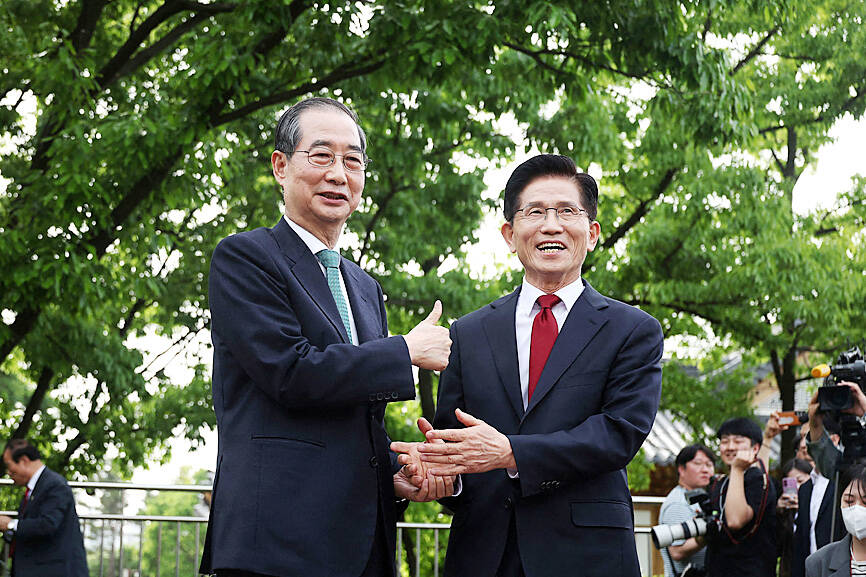South Korea’s embattled conservative party has taken the unprecedented step of nullifying its primary and replacing presidential candidate Kim Moon-soo with former South Korean prime minister Han Duck-soo just one week after Kim’s selection, deepening internal turmoil ahead of the June 3 presidential election.
Yesterday’s move by the People Power Party’s (PPP) leadership, which Kim denounced as an “overnight political coup,” underscores the desperation and disarray within the party following the ouster of former South Korean president Yoon Suk-yeol over his ill-fated attempt to impose martial law in December last year.
Kim, a staunch conservative and former labor minister under Yoon, was named the party’s presidential candidate on Saturday last week after winning 56.3 percent of the primary vote, defeating a reformist rival who had criticized Yoon’s martial law.

Photo: Reuters
The party leadership, dominated by Yoon loyalists, has spent the past week pressuring Kim to step aside and back Han, whom they believe stands a stronger chance against liberal Democratic Party frontrunner Lee Jae-myung.
Han served as acting president after Yoon was impeached by the legislature in December and officially removed by the Constitutional Court last month. He resigned from office on May 2 to pursue a presidential bid, arguing his long public service career qualifies him to lead the country amid growing geopolitical uncertainty and trade challenges intensified by the policies of US President Donald Trump.
After failed talks between Han and Kim to unify their candidacies, the PPP’s emergency committee canceled Kim’s nomination in early yesterday morning and officially registered Han as a party member and its new presidential candidate.
The replacement still requires confirmation through an all-party vote and approval by the party’s national committee today, which is the deadline for candidates to register with the election authorities.
Han in a message issued through the party claimed “if we unite, we can surely win.”
Speaking at a news conference, Kim lamented “democracy in our party died” and vowed to take unspecified legal and political steps, but it remained unclear whether any realistic path existed to restore his candidacy without the party’s cooperation.
Kim had opposed the legislature’s impeachment of Yoon,
although he said he disagreed with Yoon’s decision to declare martial law. Kim had gained popularity among hardline PPP supporters after he solely defied a Dec. 11 demand by an opposition lawmaker that all Cabinet members stand and bow in a gesture of apology for Yoon’s martial law enactment at the National Assembly.
Han and Kim have lagged well behind Lee in recent opinion polls. Lee, who spearheaded the Democrats’ efforts to oust Yoon, ridiculed the PPP efforts to switch candidacies, telling reporters on Thursday that “I have heard of forced marriages but never heard of forced unity.”
Lee has long cultivated an image as an anti-establishment figure capable of tackling South Korea’s entrenched inequality and corruption. However, critics view him as a populist who fuels division and vilifies opponents, warning that his leadership could further polarize the country.
He currently faces five trials for corruption and other criminal charges. If he becomes president, those trials would likely stop because of special presidential immunity from most criminal charges.

In the sweltering streets of Jakarta, buskers carry towering, hollow puppets and pass around a bucket for donations. Now, they fear becoming outlaws. City authorities said they would crack down on use of the sacred ondel-ondel puppets, which can stand as tall as a truck, and they are drafting legislation to remove what they view as a street nuisance. Performances featuring the puppets — originally used by Jakarta’s Betawi people to ward off evil spirits — would be allowed only at set events. The ban could leave many ondel-ondel buskers in Jakarta jobless. “I am confused and anxious. I fear getting raided or even

Eleven people, including a former minister, were arrested in Serbia on Friday over a train station disaster in which 16 people died. The concrete canopy of the newly renovated station in the northern city of Novi Sad collapsed on Nov. 1, 2024 in a disaster widely blamed on corruption and poor oversight. It sparked a wave of student-led protests and led to the resignation of then-Serbian prime minister Milos Vucevic and the fall of his government. The public prosecutor’s office in Novi Sad opened an investigation into the accident and deaths. In February, the public prosecutor’s office for organized crime opened another probe into

RISING RACISM: A Japanese group called on China to assure safety in the country, while the Chinese embassy in Tokyo urged action against a ‘surge in xenophobia’ A Japanese woman living in China was attacked and injured by a man in a subway station in Suzhou, China, Japanese media said, hours after two Chinese men were seriously injured in violence in Tokyo. The attacks on Thursday raised concern about xenophobic sentiment in China and Japan that have been blamed for assaults in both countries. It was the third attack involving Japanese living in China since last year. In the two previous cases in China, Chinese authorities have insisted they were isolated incidents. Japanese broadcaster NHK did not identify the woman injured in Suzhou by name, but, citing the Japanese

RESTRUCTURE: Myanmar’s military has ended emergency rule and announced plans for elections in December, but critics said the move aims to entrench junta control Myanmar’s military government announced on Thursday that it was ending the state of emergency declared after it seized power in 2021 and would restructure administrative bodies to prepare for the new election at the end of the year. However, the polls planned for an unspecified date in December face serious obstacles, including a civil war raging over most of the country and pledges by opponents of the military rule to derail the election because they believe it can be neither free nor fair. Under the restructuring, Myanmar’s junta chief Min Aung Hlaing is giving up two posts, but would stay at the